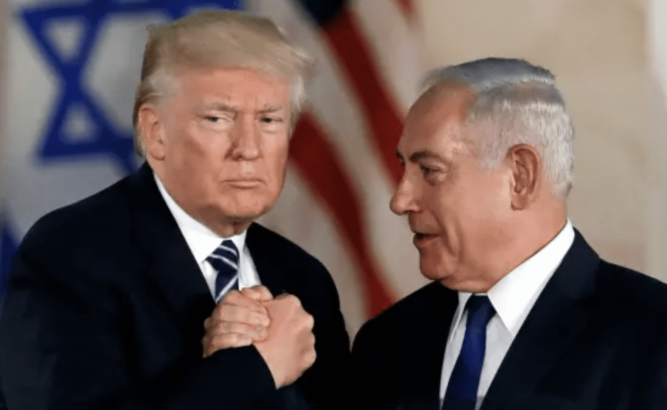U.S. President Donald Trump and Israeli Prime Minister Benjamin Netanyahu shaking hands after Trump’s address at the Israel Museum in Jerusalem, May 2017. Credit: RONEN ZVULUN/ REUTERS
Trump’s motive in exiting the Iran deal may have been to trash yet another piece of Obama’s legacy, but the target was more than just the deal: it was Iran. Netanyahu hopes US sanctions will cause a deepening economic crisis in Iran and ultimately regime change – a small-scale version of the disintegration of the USSR.
A few minutes past two in Washington, the president of the United States adopted the “Netanyahu Doctrine” wholesale and made it official American policy.
Donald Trump’s announcement to exit the Iran nuclear deal could have been scripted by Benjamin Netanyahu. Word. For. Word.
This wasn’t about improving or “fixing” the Iran deal. It was nixing and deep-sixing the Joint Comprehensive Plan of Action (JCPOA), and making sure it can never be resurrected. Without any pretense of setting up an alternative arms-control deal or a Plan B.
They have a broader philosophy of how to block Iran from achieving nuclear weapons. This is the Netanyahu Doctrine.
Netanyahu believes the unspecified and tougher sanctions Trump spoke of could ultimately force Iran to negotiate and sign a much tougher arms control agreement.
Trump’s motive may have been to obliterate his predecessor Barack Obama’s foreign policy legacy. But for his team of advisers who prepared the announcement, the target was not just the deal: it was Iran.
This is a victory for Netanyahu and the Iran hawks in the Republican Party – and few victories have been so emphatic.
Before he joined the presidential race three years ago next month, Trump knew little about the Iran deal and cared even less, But for others, this is not just about pulling out of the JCPOA.
It is part of a much wider campaign to confront Iran, one that always believed in a very different approach to that of the Obama administration and its European allies in striking the Iran deal. They have a broader philosophy of how to block Iran from achieving nuclear weapons. This is the Netanyahu Doctrine.
Netanyahu believes the unspecified and tougher sanctions Trump spoke of could ultimately force Iran to negotiate and sign a much tougher arms control agreement – one with stricter inspection requirements, a more comprehensive dismantlement of the uranium enrichment program and no time limits on its implementation.
But there is a deeper desire, one that is rarely mentioned in public: In private, Netanyahu has been speaking hopefully in recent days of the deepening economic crisis in Iran and the prospect of renewed sanctions bringing the Islamic Republic to its knees, ultimately achieving regime change.
The dream scenario is a smaller-scale version of the Soviet Union’s disintegration in the early 1990s. Just as Netanyahu’s heroes Ronald Reagan and Margaret Thatcher stood up to the Soviets and pushed them into an arms race that bankrupted Moscow and broke up the USSR, so he believes the sanctions can do likewise to Iran.
Trump overtook Netanyahu’s ambitions. Only a few weeks ago, Netanyahu was still uncertain whether the president would indeed go all the way. Late last year, Netanyahu said he now preferred the “fix it” to the “nix it” option. He felt then-Secretary of State Rex Tillerson and Defense Secretary James Mattis had prevailed over Trump to keep the Iran deal, despite all he had said about it during the campaign.
In recent weeks, though, perhaps as a result of the appointments of new Secretary of State Mike Pompeo and National Security Adviser John Bolton – although perhaps Trump was always going to do it – it became clearer he was prepared to burn all the JCPOA bridges.
Not that there are ever any assurances when it comes to Trump. That’s why last week’s “Iran lied” presentation in Tel Aviv – where Netanyahu put on show the Iranian nuclear archives Israel had seized in Tehran and spirited away – was staged for the benefit of one viewer in the Oval Office. It did the trick and sealed the Iran deal’s fate.
The next step for Netanyahu and his allies in Washington is trying to prevent Trump’s isolation and get at least some of the other signatories of the JCPOA on board.
The statement from the Saudi ambassador to the United States, supporting Trump’s announcement, was an important first step. Netanyahu will be flying to Moscow on Wednesday for an emergency meeting with Russian President Vladimir Putin. No one expects Russia to support Trump as well, but Netanyahu is hoping to gauge Putin’s reaction and prevent a situation whereby the Kremlin engineers a rift between the United States and its European allies Britain, Germany and France.
Federica Mogherini, the European Union’s foreign policy chief, is trying to keep the JCPOA alive in its original form, just without the Americans. In their joint statement following Trump’s announcement, Theresa May, Angela Merkel and Emmanuel Macron expressed their “regret and concern,” and called for preserving the Iran deal. But they also opened the door to a new deal “taking the JCPOA as a base,” but also addressing “other major issues of concern.”
That is the room which Netanyahu and other supporters of Trump’s announcement now have to maneuver in. But if the Europeans, along with Russia, work out a way to keep the deal with Iran alive without the United States, then so be it. Trump has already declared that as far as he’s concerned, the Iran deal and all of them can drop dead.




